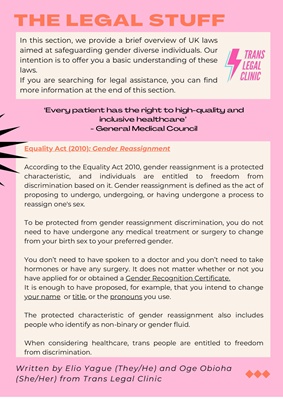
Equality Act (2010): Gender Reassignment
According to the Equality Act 2010, gender reassignment is a protected
characteristic, and individuals are entitled to freedom from
discrimination based on it. Gender reassignment is defined as the act of
proposing to undergo, undergoing, or having undergone a process to
reassign one's sex.
To be protected from gender reassignment discrimination, you do not
need to have undergone any medical treatment or surgery to change
from your birth sex to your preferred gender.
You don't need to have spoken to a doctor and you don't need to take
hormones or have any surgery. It does not matter whether or not you
have applied for or obtained a Gender Recognition Certificate.
It is enough to have proposed, for example, that you intend to change
your name or title, or the pronouns you use.
The protected characteristic of gender reassignment also includes
people who identify as non-binary or gender fluid.
When considering healthcare, trans people are entitled to freedom
from discrimination.
'Every patient has the right to high-quality and
inclusive healthcare'
- General Medical Council
THE LEGAL STUFF
In this section, we provide a brief overview of UK laws
aimed at safeguarding gender diverse individuals. Our
intention is to offer you a basic understanding of these
laws.
If you are searching for legal assistance, you can find
more information at the end of this section.
Written by Elio Yague (They/He) and Oge Obioha
(She/Her) from Trans Legal Clinic